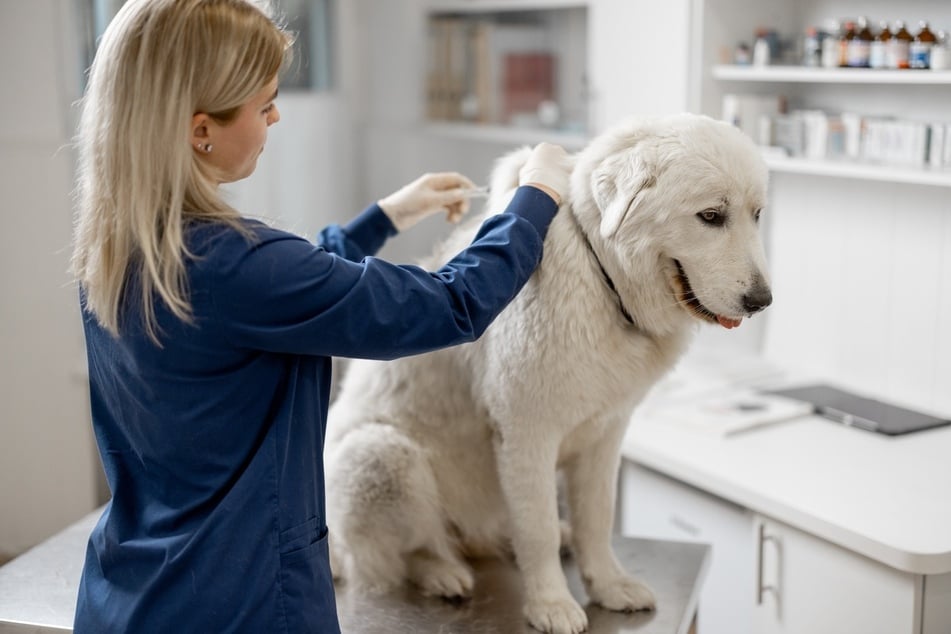Dog vaccinations: What vaccines are available and how much do they cost?
Dogs bring a lot of joy to our lives, and it is our responsibility to keep them happy, safe, and healthy. Vaccinations are an extremely important part of that process, but what do you need to know?

Getting your dog vaccinated might be a stressful process, but it's one that is totally necessary if your dog is to have a long and happy life.
These shots will protect your perfect pooch against a variety of dangerous infections and diseases, but should only be given at the direction of your veterinarian.
In this dog guide, TAG24 takes a look at dog vaccinations. What vaccines are available for dogs, and what should you consider before having them done? How much do they cost?
Let's break things down.
Why are dog vaccinations important?
Vaccines provide a powerful line of defense, and often complete immunity, against nasty pathogens, diseases, and illnesses that can infect and attack your dog. Many experts agree that by getting your dog vaccinated, you are protecting it and giving its body the resources to fight many kinds of bacteria, fungi, and viruses in the future.
In order to prepare your dog's immune system to fight off pathogens, these vaccines form antibodies within your dog which act as an instruction manual on how its body and immune system can fight off certain health risks. Sometimes this results in total immunity against a certain disease, and in other cases this simply helps your dog fight off future infections easier and faster.
Call the doctor: This article should not be taken as medical advice. Instead, we will simply present a number of vaccines that are often important for dogs. The most important thing to remember is that your veterinarian's opinion is king. If you are concerned for your dog, or want more information on vaccines, go to your vet first and act upon their advice only.
What vaccines are available for dogs?
It is essential to understand vaccinations well, and to have your dog checked thoroughly by your veterinarian before beginning the process. There are a variety of different vaccines which do a variety of different things, and depending on where you live in the US, some will be compulsory and some will not.
Some of the most common dog vaccines in the USA include:
- Rabies
- Parvovirus
- Canine distemper
- Leptospirosis
- Hepatitis (HCC)
We will now go through each of these five important vaccinations, explain what they protect against, and help give you a better understanding of them.
Important note: There are a variety of combination vaccines available for dogs as well, some of which include many of the vaccinations listed and discussed here. On top of that, please note that this is not a complete list.
Rabies
Rabies is one of the most dangerous diseases that can afflict your darling doggo. It is, as you may know, always fatal. Within a two to ten week incubation period, it is primarily spread through the bite of another dog or animal. Famously, rabies causes a variety of nasty behavioral changes, paralysis, and increased aggression.
The mortality rate for rabies is 100%, and as a result, rabies vaccines are compulsory in most US states and most countries worldwide.
Parvovirus
Canine parvovirus is a scourge upon the doggo population, with mortality reaching above 90% among cases that are not detected or not treated. It is highly contagious and, as a result, a good idea to have your dog vaccinated against it. If you are concerned about parvovirus, your vet should be contacted.
If you are worried that your doggo already has parvovirus and hasn't been vaccinated, signs of the disease include increased lethargy, a loss of appetite, severe bloating and abdominal pain, vomiting, diarrhea, and fevers.

Distemper
Distemper is a highly contagious virus that can often become fatal to dogs. While between 25-50% of dogs with distemper die of the disease, it is not quite as lethal as rabies, but is still incredibly dangerous. Symptoms include twitching, seizures, pneumonia, cold and flu symptoms, and severe weakness.
It is important to have your dog vaccinated against distemper before it mingles with other dogs. This is because the disease is extremely contagious and can spread quickly through a population.
Leptospirosis
Leptospirosis is a bacterium found and spread through water, which affects humans and animals alike. It is treatable in humans with antibiotics, but in cats and dogs it can become a little more troublesome. If not treated early and quickly, dogs can suffer from permanent kidney or liver damage.
As a result, it is a good idea to have your dog vaccinated against leptospirosis. What's also important is to avoid letting your dog drink any water that has not been provided to it by you, via the tap.
Canine hepatitis (HCC)
Hepatitis is a particularly rough disease that infects dogs and targets a number of their critical organs. It is hugely contagious and directly attacks the kidneys, lungs, liver, and a variety of other organs. It can, if left untreated, lead to the death of your pup.
The vaccination for canine hepatitis, like the rabies vaccine, is mandatory in most US states, and for good reason. It is spread through saliva and other discharges between doggos, making it hard to avoid.
What are other vaccinations for dogs?
You want to protect your dog as much as possible and to guarantee it a long and healthy life, full of energy and fun. To do this you need to address their health, which can often be the invisible elephant in the room. The vaccinations we have already discussed are some of the more important and common ones, but there are plenty more.
Here's a run-down of a few vaccinations that are also available for your dog:
Leishmaniasis: Often a required vaccination when you travel with your dog, this is caused by a parasite transmitted primarily by sand flies. If left untreated, it can reach fatality rates higher than 90%. It is a particular problem in France, Spain, and Portugal.
Canine herpes virus: Yes, dogs can get herpes too. Pregnant dogs often need to be vaccinated against canine herpes because it can cause particular problems during the birthing process, sometimes causing puppy mortality.
Kennel cough: Kennel cough can be a particular problem for dogs who have been adopted from a shelter. There are a variety of different types of kennel cough, and vaccinations can help to resolve most of the risk.
Pathogens spread by parasites: There are a vast assortment of different pathogens spread through ticks, fleas, and other parasites. They can often damage your dog's nervous system, so it's a good idea to give your dog the best protection available.
Again, we are not here to provide advice on what vaccines you should or shouldn't get. This is not an exhaustive selection, and you should get advice from your veterinarian before making any medical decisions for your dog.
What do dog vaccinations cost?

It's a good idea to have your dog insured, to reduce the cost of such medical procedures, and also to guarantee that your doggo will get the best care possible.
Ultimately, though, vaccinations aren't usually the most expensive part of looking after your darling doggo. It also, of course, depends on the specific vaccines you are looking at getting.
Rabies is on the lower end of the vaccine cost list, usually sitting at between $15 and $20 without insurance. Other than that, most dog vaccines will set you back $75-100 per shot, which adds up rather quickly.
Vaccinations for dogs are important and extremely low-risk
Vaccinating your pets is incredibly important, and in many places, a legal requirement. Each state and county will have different rules on the required vaccinations locally, so it's best to get up-to-date info by checking the relevant locality's websites or preferably by going to your veterinarian.
Ultimately, vaccines are incredibly low-risk for your dog and incredibly high-reward. The most important thing to do is to be in constant contact with your vet, go by their recommendations, and get official medical advice before you make decisions.
Cover photo: 123RF/belchonock




